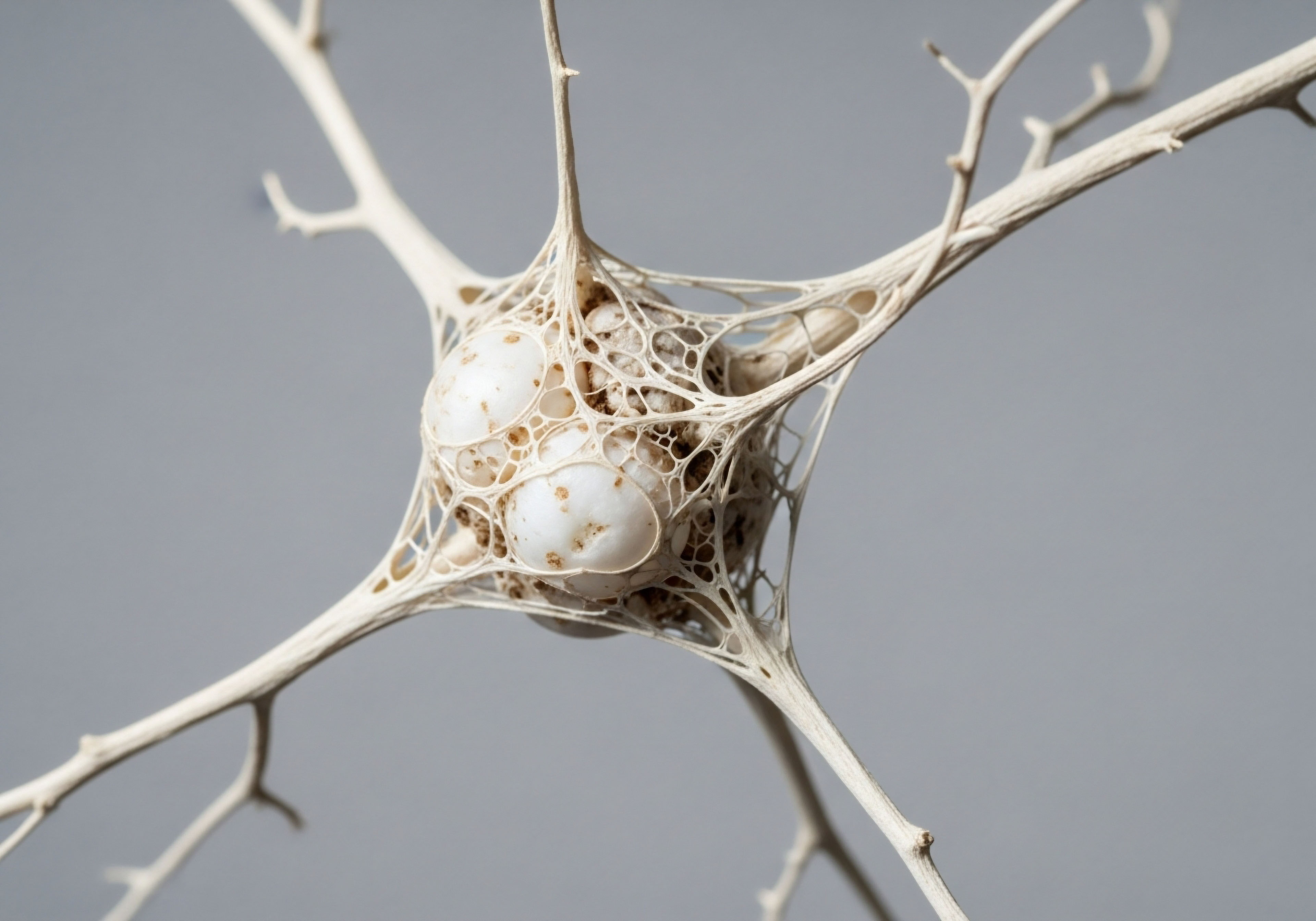

Fundamentals
Many individuals experiencing shifts in their vitality often find themselves confronting a perplexing array of symptoms. These include persistent fatigue, changes in body composition, alterations in mood, and a diminished zest for life. These experiences frequently prompt a deeper inquiry into the underlying biological currents shaping one’s well-being. A profound understanding reveals that such manifestations often trace their origins to the delicate symphony of the endocrine system, a complex network orchestrating the body’s internal communications.
Hormones, these potent chemical messengers, circulate throughout the bloodstream, influencing nearly every physiological process, from metabolism and growth to mood and reproductive function. When this intricate messaging system encounters disruptions, the ripple effects can extend throughout the entire organism, subtly altering cellular function and, consequently, our subjective experience of health. Targeted endocrine therapies offer precise interventions to recalibrate these hormonal imbalances, restoring specific biochemical signals to optimal ranges.
Reclaiming personal vitality often begins with understanding the intricate, often subtle, language of our body’s internal chemical messengers.
The human body possesses an extraordinary capacity for adaptation and self-regulation. Lifestyle interventions represent a powerful, often underutilized, modality for supporting this innate intelligence. These practices extend beyond merely managing symptoms; they cultivate an internal environment conducive to optimal hormonal function, synergistically augmenting the effects of targeted therapeutic protocols. Integrating deliberate choices concerning nutrition, movement, restorative sleep, and mindful stress navigation creates a foundational resilience within the body’s complex systems.

The Endocrine System’s Orchestration
Consider the endocrine system as the body’s grand orchestra, where each hormone represents a distinct instrument, playing its part in a harmonious composition. When one instrument falters, the entire piece loses its intended resonance. Conditions such as hypogonadism, perimenopause, or age-related growth hormone decline represent moments when certain sections of this orchestra require specific, expert guidance. Endocrine-targeted therapies, such as testosterone optimization or peptide protocols, introduce a skilled conductor to restore the rhythm and melody.
The efficacy of these therapeutic conductors, however, hinges significantly on the quality of the instruments and the readiness of the musicians. Lifestyle interventions directly address these foundational elements, enhancing the cellular receptivity to hormonal signals and optimizing the metabolic pathways through which hormones are synthesized, transported, and metabolized. This collaborative approach recognizes the individual as an active participant in their own biochemical recalibration, moving beyond a passive reception of treatment.


Intermediate
For individuals already acquainted with the foundational principles of hormonal health, the deeper question arises ∞ how precisely do daily habits interact with advanced endocrine-targeted therapies to sculpt a landscape of enduring well-being? The answer lies in the profound, often bidirectional, interplay between our chosen lifestyle and the nuanced efficacy of biochemical recalibration protocols. Lifestyle interventions function as powerful epigenetic modulators, influencing gene expression and cellular responsiveness to therapeutic agents.
Understanding this symbiotic relationship requires a granular examination of specific protocols and the physiological mechanisms they engage. Whether considering testosterone optimization for men, hormone balance for women, or growth hormone peptide therapy, the surrounding metabolic and physiological milieu profoundly shapes outcomes. These interventions are not merely additive; they are fundamentally integrative, weaving together endogenous and exogenous influences into a cohesive strategy for vitality.

Optimizing Testosterone Protocols
Testosterone Replacement Therapy (TRT) in men, often involving weekly intramuscular injections of Testosterone Cypionate, aims to restore circulating testosterone levels. However, the body’s response to this exogenous input is not uniform. Lifestyle factors significantly influence the conversion of testosterone to estrogen via the aromatase enzyme, primarily located in adipose tissue. A diet rich in anti-inflammatory nutrients and regular resistance training can help manage body composition, thereby moderating aromatase activity and supporting a more favorable androgen-to-estrogen ratio.
- Dietary Considerations ∞ Emphasizing whole, unprocessed foods, healthy fats, and adequate protein intake supports optimal liver function and metabolic clearance pathways.
- Exercise Regimens ∞ Regular resistance training demonstrably improves insulin sensitivity and can influence androgen receptor density, enhancing the body’s utilization of available testosterone.
- Sleep Hygiene ∞ Adequate, restorative sleep directly influences the pulsatile release of GnRH, which in turn affects endogenous testosterone production, even during exogenous therapy.
For women receiving testosterone cypionate via subcutaneous injections, the principles remain analogous. Metabolic health, influenced by nutrition and physical activity, plays a critical role in how the body processes and utilizes this hormonal support. Furthermore, progesterone supplementation, often a component of female hormone balance protocols, finds enhanced efficacy when coupled with practices that mitigate systemic inflammation and support adrenal health. Chronic stress, for example, can divert hormonal precursors towards cortisol production, potentially impacting the overall endocrine balance.

Growth Hormone Peptide Therapies and Metabolic Resonance
Peptide therapies, such as those involving Sermorelin, Ipamorelin, or CJC-1295, aim to stimulate the body’s natural production of growth hormone. The effectiveness of these agents is inextricably linked to metabolic function. Growth hormone secretion is highly sensitive to blood glucose regulation and insulin signaling.
Lifestyle choices serve as critical co-factors, sculpting the cellular landscape where endocrine-targeted therapies exert their most profound influence.
Consistent dietary patterns that stabilize blood sugar, coupled with regular exercise, enhance the body’s natural pulsatile growth hormone release and improve tissue responsiveness. For individuals seeking anti-aging benefits, muscle gain, or improved sleep, the synergistic impact of these peptides with disciplined lifestyle choices becomes particularly pronounced.

Peptide Efficacy Modulators
| Lifestyle Factor | Impact on Peptide Therapy | Mechanism |
|---|---|---|
| Nutrition | Optimizes metabolic pathways, reduces inflammation. | Supports nutrient availability for cellular repair and hormonal synthesis; mitigates systemic stressors. |
| Physical Activity | Enhances tissue responsiveness, improves circulation. | Increases receptor sensitivity; promotes nutrient delivery to target tissues. |
| Sleep Quality | Regulates natural hormone pulsatility, aids recovery. | Maximizes endogenous growth hormone secretion; supports cellular repair processes. |
| Stress Management | Mitigates cortisol’s suppressive effects. | Reduces adrenal burden; preserves hormonal precursors for anabolic pathways. |
The application of lifestyle interventions transcends simple supportive measures; they represent an active engagement with the body’s inherent capacity for healing and optimization. When integrated thoughtfully with endocrine-targeted therapies, these practices create a robust internal environment, allowing for a more complete and sustained restoration of vitality and physiological function. This synergistic approach recognizes the dynamic interplay between external support and internal resilience, culminating in a more profound and enduring state of health.


Academic
The question of how lifestyle interventions augment endocrine-targeted therapies necessitates a deep dive into the intricate regulatory networks governing human physiology. From a systems-biology perspective, the efficacy of exogenous hormonal agents, or the stimulation of endogenous hormone production through peptides, is profoundly modulated by the organism’s metabolic state, inflammatory burden, and neuroendocrine equilibrium.
This exploration transcends simplistic cause-and-effect relationships, revealing a complex web of interactions where lifestyle choices exert pleiotropic effects on cellular signaling and genomic expression.
Consider the hypothalamic-pituitary-gonadal (HPG) axis, the central orchestrator of reproductive and sexual hormone production. Endocrine-targeted therapies, such as Testosterone Replacement Therapy (TRT), directly influence this axis through negative feedback loops. The introduction of exogenous testosterone, for instance, typically suppresses endogenous luteinizing hormone (LH) and follicle-stimulating hormone (FSH) secretion from the pituitary, leading to testicular atrophy and impaired spermatogenesis. However, lifestyle factors can subtly influence the sensitivity of the hypothalamus and pituitary to these feedback signals.

Metabolic Flux and Hormonal Homeostasis
Metabolic dysfunction, characterized by insulin resistance and chronic low-grade inflammation, represents a significant impediment to optimal endocrine function, even in the presence of targeted therapies. Adipose tissue, far from being an inert storage depot, acts as a highly active endocrine organ, secreting adipokines such as leptin, adiponectin, and inflammatory cytokines like TNF-alpha and IL-6. These molecules directly interfere with insulin signaling, influence steroidogenesis, and can modulate the pulsatile release of GnRH from the hypothalamus.
A diet characterized by high glycemic load and saturated fats exacerbates insulin resistance, leading to hyperinsulinemia. This state can upregulate aromatase activity, particularly in men, promoting the conversion of testosterone to estradiol, thereby diminishing the effective androgenic milieu despite exogenous testosterone administration. Conversely, structured exercise, especially high-intensity interval training and resistance training, significantly improves insulin sensitivity through GLUT4 translocation and enhanced mitochondrial biogenesis, thereby creating a more favorable metabolic landscape for hormonal action.

The Gut-Brain-Endocrine Axis ∞ A Symbiotic Relationship
A relatively nascent, yet increasingly significant, area of inquiry involves the gut microbiome’s influence on endocrine health and therapeutic responsiveness. The gut microbiota metabolizes dietary compounds and endogenous hormones, producing a diverse array of signaling molecules, including short-chain fatty acids (SCFAs) and various neurotransmitters.
Dysbiosis, an imbalance in the gut microbial community, can compromise gut barrier integrity, leading to increased intestinal permeability and systemic inflammation. This “leaky gut” phenomenon can trigger an immune response that directly impacts peripheral hormone metabolism and receptor sensitivity.
For instance, certain gut bacteria possess beta-glucuronidase activity, an enzyme that deconjugates steroid hormones (like estrogens and androgens) that have been inactivated by the liver for excretion. Elevated beta-glucuronidase activity can lead to the reabsorption of these deconjugated hormones, potentially altering circulating levels and influencing the overall hormonal burden.
Dietary interventions, rich in fermentable fibers and prebiotics, can foster a diverse and resilient gut microbiome, thereby optimizing the enterohepatic circulation of hormones and mitigating inflammatory signals that might otherwise attenuate the benefits of endocrine-targeted therapies.
The intricate dance between lifestyle, metabolic health, and the gut microbiome profoundly dictates the ultimate efficacy of endocrine-targeted interventions.
The integration of lifestyle interventions with endocrine-targeted therapies represents a sophisticated approach to personalized medicine. It acknowledges the dynamic, interconnected nature of biological systems, recognizing that pharmaceutical agents function within a complex, constantly adapting physiological environment. The ultimate goal is not merely to correct a numerical deficiency, but to restore a robust, resilient biological system capable of sustained function and vitality.

Unraveling Epigenetic Modulations
Beyond direct metabolic effects, lifestyle choices exert profound epigenetic influences. Diet, physical activity, and stress can alter DNA methylation patterns, histone modifications, and non-coding RNA expression, thereby influencing the transcription of genes involved in hormone synthesis, receptor expression, and downstream signaling pathways.
These epigenetic modifications can either enhance or diminish the cellular response to both endogenous hormones and exogenous therapeutic agents. For example, regular exercise has been shown to induce epigenetic changes in skeletal muscle that promote insulin sensitivity and mitochondrial function, factors directly relevant to growth hormone action and overall metabolic health.
| Biological Axis | Lifestyle Modulators | Therapeutic Synergy |
|---|---|---|
| HPG Axis | Stress reduction, sleep optimization, targeted nutrition. | Enhances feedback loop sensitivity, supports endogenous production during Gonadorelin use. |
| Metabolic Pathways | Glycemic control, regular exercise, body composition management. | Improves hormone receptor sensitivity, reduces inflammatory interference, optimizes drug metabolism. |
| Gut-Brain-Endocrine | Fiber-rich diet, probiotics, stress resilience. | Modulates hormone deconjugation, mitigates systemic inflammation, influences neurotransmitter balance. |
This layered understanding underscores the imperative for a holistic approach. Lifestyle interventions do not simply support endocrine therapies; they are fundamental to creating the physiological substrate upon which these therapies can exert their maximal, sustained effect. The interaction represents a true synergy, where the whole becomes greater than the sum of its parts, leading to a more profound and enduring restoration of health and vitality.

References
- Velloso, C. P. (2008). Regulation of muscle mass by growth hormone and IGF-I. British Journal of Pharmacology, 154(3), 557-568.
- Handelsman, D. J. (2013). Testosterone therapy in men. New England Journal of Medicine, 369(11), 1016-1027.
- Davis, S. R. & Wahlin-Jacobsen, S. (2015). Testosterone in women ∞ the clinical significance. The Lancet Diabetes & Endocrinology, 3(12), 980-992.
- Herman, J. P. & Tasker, J. G. (2016). Paraventricular hypothalamic pathways controlling stress coping and adaptability. Translational Psychiatry, 6(12), e965.
- Tremblay, A. & Chaput, J. P. (2009). Contribution of sleep to energy balance and obesity. Current Opinion in Clinical Nutrition and Metabolic Care, 12(5), 503-509.
- Frost, G. et al. (2014). The short-chain fatty acid acetate reduces appetite via a central neural mechanism. Nature Communications, 5(1), 3716.
- Cryan, J. F. & Dinan, T. G. (2012). Mind-altering microorganisms ∞ the impact of the gut microbiota on brain and behavior. Nature Reviews Neuroscience, 13(10), 701-712.
- Livshits, G. & Seidman, D. S. (2009). Inflammation and estrogen metabolism. Endocrine, 36(3), 361-367.
- Kelly, D. M. & Jones, T. H. (2013). Testosterone and obesity. Obesity Reviews, 14(7), 584-59 Kelly, D. M. & Jones, T. H. (2013). Testosterone and obesity. Obesity Reviews, 14(7), 584-594.

Reflection
Having traversed the intricate landscape of hormonal health and the profound impact of lifestyle, consider the knowledge you have now gained not as a destination, but as the compass for your personal health journey. The biological systems within you are unique, a complex interplay of inherited predispositions and daily choices.
This understanding empowers you to approach your well-being with informed intention, moving beyond passive observation toward active participation. Your path to reclaimed vitality, deeply personal in its manifestations, necessitates guidance tailored precisely to your unique biological narrative. This journey of self-discovery, illuminated by scientific insight, awaits your deliberate steps forward.

Glossary

lifestyle interventions

endocrine-targeted therapies

growth hormone

cellular receptivity

peptide therapy

insulin sensitivity

growth hormone secretion




